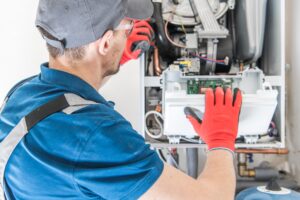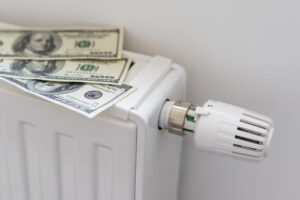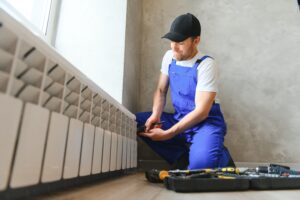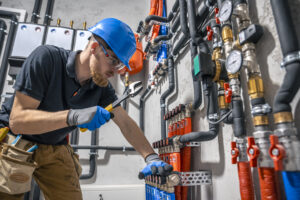When it comes to seasonal changes, your HVAC system plays a crucial role in keeping your home comfortable year-round. Whether you’re battling the heat of summer or bracing against winter’s chill, ensuring your HVAC system is ready for the switch is essential. Proper preparation not only extends the lifespan of your system but also improves efficiency and reduces energy costs.
Want to keep your home cozy in the winter and cool during summer? This guide will walk you through seasonal HVAC maintenance tips to ensure your system is performing at its best, no matter the time of year.
Spring HVAC Preparation
Spring is when you’ll transition from using your heating system to your air conditioning. This is the perfect time to give your system some much-needed attention after winter’s heavy use.
Schedule an AC Tune-up
Schedule a professional inspection for your air conditioner. An HVAC technician can test your unit’s components, check refrigerant levels, and identify potential issues before they escalate. A tune-up ensures your AC is ready for the sweltering months ahead.
Clean and Clear Vents
Spring cleaning isn’t just for your garage or closets! Dust and debris commonly accumulate in your HVAC vents during the winter. Cleaning them in the spring improves airflow and prevents allergens triggered by accumulated debris. Don’t forget to inspect outdoor units and clear away leaves or dirt that could obstruct the system.
Replace Filters
Dirty air filters can significantly impact the efficiency of your HVAC system and reduce indoor air quality. Spring is the perfect time to swap out old filters for fresh ones. Change them every one to three months to keep the air in your home clean and fresh.
Summer HVAC Preparation
Summer can place immense strain on your cooling system as it works overtime to keep your home cool. Preparing early ensures maximum efficiency during peak usage hours.
Maximize Efficiency
To beat the heat without jacking up your energy bills, focus on optimizing your system’s efficiency:
- Use a programmable or smart thermostat to adjust temperature settings when you’re away.
- Seal gaps around windows and doors to keep cool air inside and prevent energy waste.
- Close curtains during peak sunlight to reduce heat gain.
Check for Refrigerant Leaks
Your air conditioner depends on refrigerant for cooling. If levels are low, it’s an indicator of a leak. Leaks not only reduce cooling efficiency but may also damage your unit over time. An annual HVAC check-up can address any refrigerant issues to keep everything running smoothly.
Ensure Proper Ventilation
During the summer, ensure vents and ducts are clear of any obstructions. This guarantees proper airflow and reduces unnecessary strain on your AC. Hiring a professional to inspect and clean your ductwork might be a smart move.
Fall HVAC Preparation
With cooler temperatures creeping in, fall is the perfect time to shift focus from cooling to heating. Preparing early prevents last-minute issues when the temperatures drop.
Inspect Your Heating System
Before you crank up the heat, schedule a thorough inspection of your heating system. A technician can examine your furnace or boiler, check for leaks, and recalibrate the thermostat. Safety should always be a priority when preparing for the colder months.
Check Insulation
Good insulation is critical for keeping warm air in and cold air out. Inspect your attic, walls, and flooring for adequate insulation and address any weak spots. Proper insulation reduces the amount of work your HVAC system has to do, which lowers energy costs and enhances efficiency.
Test Carbon Monoxide Detectors
Every fall, test your carbon monoxide detectors to ensure they’re functioning properly. Faulty heating equipment is a leading source of carbon monoxide leaks, so ensure your home safety systems are up-to-date.
Winter HVAC Preparation
Winter comes with its own unique challenges for HVAC systems. Preparing early helps ensure uninterrupted comfort during the colder months.
Prevent Frozen Pipes
Frozen pipes can cause serious damage to your heating system and home. Insulate exposed pipes in unheated areas to reduce the risk of freezing. Keep your thermostat at a consistent temperature—even when you’re away—to keep pipes warm.
Ensure Furnace Safety
Have your furnace professionally inspected for soot buildup, leaks, or cracked heat exchangers. These potential hazards can affect both safety and performance. If your furnace requires repairs, tackle them early to avoid mid-winter breakdowns.
Maintain Humidity Levels
Winter air is notoriously dry, which can take a toll on your comfort and health. Invest in a humidifier to maintain ideal indoor humidity levels. Humid air feels warmer, allowing you to lower the thermostat and save on energy costs.
The Year-Round Benefits of Regular Maintenance
Taking the time to prepare your HVAC system for seasonal changes ensures year-round comfort, safety, and improved efficiency. It’s not only an investment in your home but also a way to reduce unexpected repair costs and extend the life of your system.
By adhering to these seasonal maintenance tips, you’ll notice the following long-term benefits:
- Lower Energy Bills: A well-maintained system operates more efficiently, reducing energy consumption.
- Extended Lifespan: Regular upkeep prevents significant wear and tear on your HVAC unit.
- Enhanced Performance: Your home remains comfortable regardless of the season, with less downtime for repairs.
- Improved Air Quality: Clean filters and ductwork remove allergens, offering a fresher indoor environment.
If you’re not ready to take on HVAC maintenance yourself, consider enlisting a professional. Certified technicians from New Jersey HVAC have the expertise and tools needed to keep your system running smoothly year-round.






